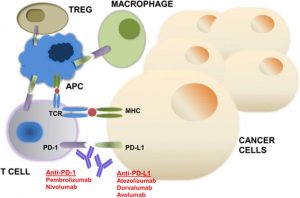PD1 Therapy For Cancer:

In a medical trial in the USA, 12 patients were completely cured of rectal cancer without requiring any surgery or chemotherapy.
- The trial used a monoclonal antibody dostarlimab every three weeks for six months for the treatment of a particular kind of stage two or three rectal cancer.
- The study was done by doctors from the Memorial Sloan Kettering Cancer Centre in New York.
- The trial showed that immunotherapy alone – without any chemotherapy, radiotherapy, or surgery that have been staples of cancer treatment – could completely cure the patients with a particular kind of rectal cancer called ‘mismatch repair deficient’ cancer.
- ‘Mismatch repair deficient’ cancer is most common among colorectal, gastrointestinal, and endometrial cancers.
- Patients suffering from this condition lack the genes to correct typos in the DNA that occur naturally while cells make copies.
- Immunotherapy is a treatment that uses a person’s own immune system to fight cancer. Immunotherapy can boost or change how the immune system works so it can find and attack cancer cells.
- Immunotherapy belongs to a category called PD1 blockades that are now recommended for the treatment of such cancers rather than chemotherapy or radiotherapy.
PD1 Therapy:
- PD1 is a type of protein that regulates certain functions of the immune system, including by suppressing T cell activity, and PD1 blockade therapy looks to release the T cells from this suppression.
- T-cells are the White Blood cells (WBCs). They are critical for developing immunity towards common pathogens or antigens.
- Earlier, this therapy was used post-surgery, but the study has shown that surgery may not be required.
- Although the therapy is usually used for cancers that have metastasised (spread to locations other than where the cancer formed), it is now recommended for all mismatch repair deficient cancers as they result in quicker improvement and lesser toxicity as compared to traditional chemo and radiotherapy.
- Eliminating other treatments can improve a patient’s quality of life by preserving fertility, sexual health, and bladder and bowel functions.




